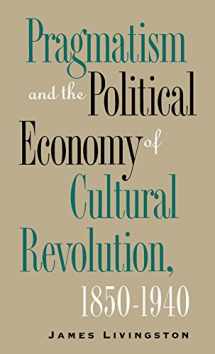
Pragmatism and the Political Economy of Cultural Revolution, 1850–1940 (Cultural Studies of the United States)
ISBN-13:
9780807821572
ISBN-10:
0807821578
Author:
James Livingston
Publication date:
1997
Publisher:
The University of North Carolina Press
Format:
Paperback
424 pages
FREE US shipping
Book details
ISBN-13:
9780807821572
ISBN-10:
0807821578
Author:
James Livingston
Publication date:
1997
Publisher:
The University of North Carolina Press
Format:
Paperback
424 pages
Summary
Pragmatism and the Political Economy of Cultural Revolution, 1850–1940 (Cultural Studies of the United States) (ISBN-13: 9780807821572 and ISBN-10: 0807821578), written by authors
James Livingston, was published by The University of North Carolina Press in 1997.
With an overall rating of 3.6 stars, it's a notable title among other
books. You can easily purchase or rent Pragmatism and the Political Economy of Cultural Revolution, 1850–1940 (Cultural Studies of the United States) (Paperback) from BooksRun,
along with many other new and used
books
and textbooks.
And, if you're looking to sell your copy, our current buyback offer is $0.06.
Description
The rise of corporate capitalism was a cultural revolution as well as an economic event, according to James Livingston. That revolution resides, he argues, in the fundamental reconstruction of selfhood, or subjectivity, that attends the advent of an 'age of surplus' under corporate auspices. From this standpoint, consumer culture represents a transition to a society in which identities as well as incomes are not necessarily derived from the possession of productive labor or property. From the same standpoint, pragmatism and literary naturalism become ways of accommodating the new forms of solidarity and subjectivity enabled by the emergence of corporate capitalism. So conceived, they become ways of articulating alternatives to modern, possessive individualism. Livingston argues accordingly that the flight from pragmatism led by Lewis Mumford was an attempt to refurbish a romantic version of modern, possessive individualism. This attempt still shapes our reading of pragmatism, Livingston claims, and will continue to do so until we understand that William James was not merely a well-meaning middleman between Charles Peirce and John Dewey and that James's pragmatism was both a working model of postmodern subjectivity and a novel critique of capitalism.


We would LOVE it if you could help us and other readers by reviewing the book
Book review

Congratulations! We have received your book review.
{user}
{createdAt}
by {truncated_author}


